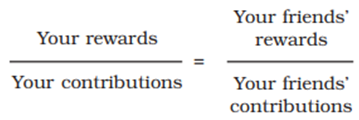- Books Name
- Psychology Book Class-12
- Publication
- PathSet Publications
- Course
- CBSE Class 12
- Subject
- Psychology
Intergroup Conflict: Nature and Causes
- Conflict is a process in which either an individual or a group perceives that others (individual or group) have opposing interests, and both try to contradict each other.
- There is this intense feeling of ‘we’ and ‘other’/‘they’.
- There is also a belief by both parties that the other will protect only its own interests; their (the other side’s) interests will, therefore, not be protected.
- There is not only opposition of each other, but they also try to exert power on each other.
- Groups have been found to be more aggressive than individuals.
- This often leads to escalation of conflict.
- All conflicts are costly as there is a human price for them.
- Reasons for group conflicts:
- Lack of communication and faulty communication by both parties.
This kind of communication leads to suspicion, i.e. there is a lack of trust. Hence, conflict results.
- Relative deprivation
When members of a group compare themselves with members of another group, and perceive that they do not have what they desire to have, which the other group has.
They feel that they are not doing well in comparison to other groups. This may lead to feelings of deprivation and discontentment, which may trigger off conflict.
- One party’s belief that it is better than the other, and what it is saying should be done.
When this does not happen, both parties start accusing each other.
One may often witness a tendency to magnify even smaller differences, thereby conflict gets escalated because every member wants to respect the norms of her/his group.
- A feeling that the other group does not respect the norms of my group, and actually violates those norms because of a malevolent intent.
- Desire for retaliation for some harm done in the past
- Biased perceptions are at the root of most conflicts. As already mentioned earlier, feelings of ‘they’ and ‘we’ lead to biased perceptions.
- When acting in groups, people are more competitive as well as more aggressive than when they are on their own.
Groups compete over scarce resources, both material resources, e.g. territory, and money as well as social resources, e.g. respect and esteem.
- Perceived Inequity
Equity refers to distribution of rewards in proportion to an individual’s contributions.

But if you contribute more and get less, one may feel irritated and exploited.
- Conflicts between groups give impetus to a series of social and cognitive processes.
These processes harden the stand of each side leading to ingroup polarisation.
This may result in coalition formation of like-minded parties, thereby increasing the apprehensions of both parties resulting in misperceptions, and biased interpretations and attributions.
The result is increased conflict.
- Gardner Murphy wrote a book entitled ‘In the Minds of Men’.
According to it, most conflicts begin in the minds of men and then go to the field.
Explanations of such conflicts can be at:
- Structural level
Structural conditions include:
- high rates of poverty
- economic and social stratification
- inequality
- limited political and social opportunity
- Group Level
Following group level factors lead to escalation of conflict:
- social identit
- realistic conflict between groups over resources
- unequal power relations between groups
- Individual Levels
Following are the important determinants of conflict:
- beliefs
- biased attitudes
- personality characteristics
At the individual level, there is a progression along a continuum of violence.
Small acts that initially may have no significance, like calling the other group a name, may lead to psychological changes that make further destructive actions possible.
Deutsch identified the following consequences of intergroup conflict:
- Communication between the groups becomes poor. The groups do not trust each other, thereby leading to a breakdown in communication and this generates suspicion for each other.
- Groups start magnifying their differences and start perceiving their behaviour as fair and the other’s behaviour as unfair.
- Each side tries to increase its own power and legitimacy. As a consequence, the conflict gets escalated shifting from few specific issues to much larger issues.
- Once conflict starts, several other factors lead to escalation of conflict which are:
- Hardening of ingroup opinion
- Explicit threats directed at the outgroup
- Each group retaliating more and more
- Other parties also choosing to take sides

 PathSet Publications
PathSet Publications
